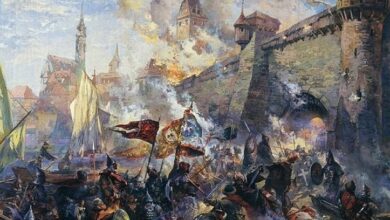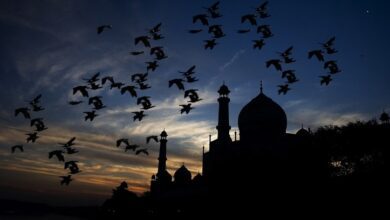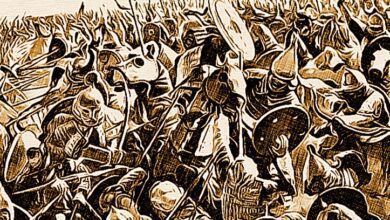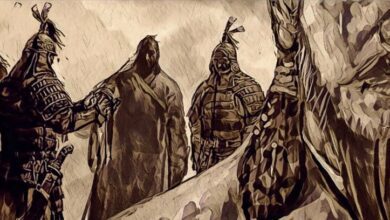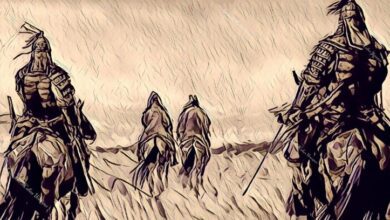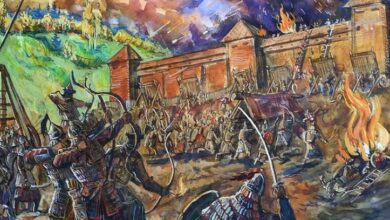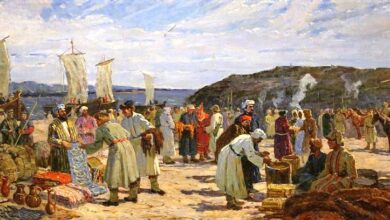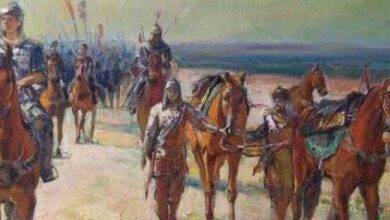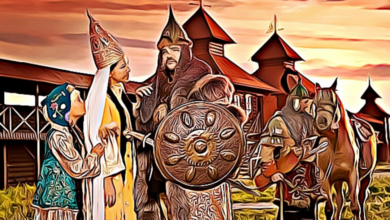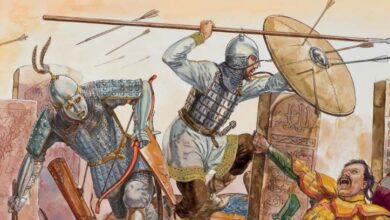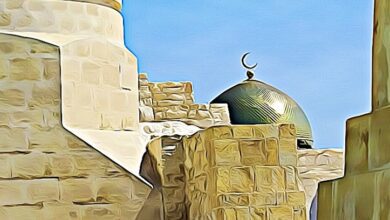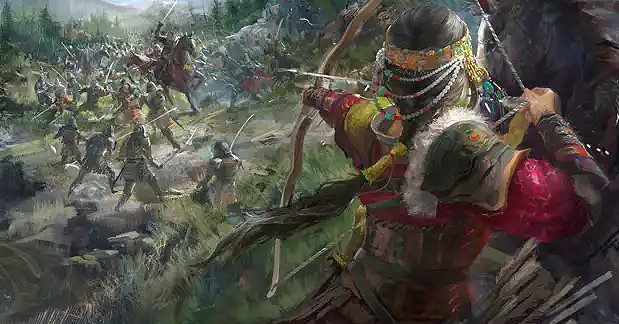
Ghazi Baraj Tarihi. Chapter 16
MAsgut was raised to the throne, after which he immediately released Vasyl and approved Sal-Sal as the governor of Kashan. Encouraged by this, the Ulugbek defeated the army of Bulymer and put the Ulubiy before the choice of either submission to the Bulgar, or death under the hooves of the Tulpars and the swords of the Bulgar bakhadirs. Being on the verge of complete despair, Bulymer appealed to Ibrahim with a plea to immediately take the throne and stop the war, promising to triple the size of the Djir tribute, to renounce claims to the Khazar territories and to open all the cities and roads of Rus' for the Bulgar merchants. Just at that time, unrest broke out in Bolgar, led by Nasyr's son Kul-Mohammed. On behalf of the participants in the unrest - the noble masters - the young son of Sheikh Musa Khuja Ahmed addressed the Kan right on the market square with a demand to immediately stop the war and lower the taxes. Masgut ordered to seize Khuja Ahmed and take him out of the country along Khorys-Yula, but this only added fuel to the fire. Masgut summoned a kursybai, but while he was approaching, the people had already laid siege to him in the citadel of Bolgar. Having learned about these events, Ibrahim immediately moved from Bulyar to the capital with the Subash, Chirmysh and city militias. On the other hand, Kazanchis moved from Nur-Suvar to Bolgar, wanting to settle accounts with the murderer of Timar, who was kind to them. But Misha-Yusuf, the son of the 90-year-old old man Kermek, expelled by Masgut from his own city, was ahead of everyone. When he left for the capital and began to approach the Baryndzhar Gate with his detachment, Masgut could not stand it and fled from Bolgar to Batysh. Kazanchis, who came after this, wanted to enter the citadel and raise the grandson of Jakyn, the son of Abdallah Tuktar, to the throne, but Misha-Yusuf did not let them in and surrendered Mumin-Kerman to Ibrahim. He, the son of Mara Ju-Malik, the son of Bulat Hassan and Sal-Sal, who arrived, raised Ibrahim to the throne of the State. But tebir Masgut and ulan Tuktar were moved away from him...
Bulymer immediately signed peace with Bulgar on the above conditions, and Ibrahim reduced the kursybay to a thousand people, giving the rest allotments and benefits. He immediately returned Khuja Ahmed from Rus', and when he went back, he adopted and adopted his son Ishak and was nicknamed Abu-Ishak.
107
About the time of the reign of Ibrahim, I learned very little essential from our chronicles ...
Kan ruled according to the laws of Almysh and Talib, so under him the State was calm and abundant. The Kan was not very interested in what was happening outside the country!, and only the delay in paying the "usury" once forced him to move his hand ...
After the death of Bulymer in Rus', a war for supremacy began between his sons. Myshdauly, who was sitting in Dima-Tarkhan and enjoyed the support of Rum, won. By his order, the defeated Ar-Aslan had to treacherously kill one of the sons of Bulymer from Bozok - Khalib, and the servants of Myshdauly himself slaughtered another son of Bozok - Barys, as the main contenders for the paternal throne ... Myshdauly stopped paying tribute for Djir, which forced Ibrahim to send Kan of the governor of Mardan Gilas. Gilas immediately took Kan and established here one of the Haddads, Kurdan, who was friendly to the State. Ar-Aslap, contrary to the orders of Myshdauly, did not move to help him, for which Ibrahim helped him cope with a severe famine in Balyn. Moreover, encouraging Ar-Aslap to overthrow the igd of Myshdauly, Ibrahim sent him a Kan cap, a copy of his own. He made only three such hats, the house of the master Atrak bine Musa. Shortly before his death, Ibrahim sent another cap along with a copy of Bakir's Notes, decorations and a lot of money for the construction of mosques to the Sultan of Khorasan Mahmud. The Sultan was considered a descendant of the Messenger himself, and the Kan hoped to get healing from a serious illness from him for this. Huja Ahmed brought the gifts and stayed with the Sultan at his request. From Khorasan he traveled to... Khuja Ahmed also sent medicines to Ibrahim, but they did not have time to reach him: the kan died after several months of torment and was buried in his castle Alamir-Sultan. And Ibrahim built this castle right after the Bulymer war. Then he feared an attack by Timar and hoped, in which case, to take refuge in a strong and distant castle from the capital. In addition, on the orders of Ibrahim, on the site of the menzel (“jam”) at the mouth of the Aka or Sain-Ideli, a balik of Junne-Kala, which was also called Jun, was built in 1021. And so it was called by one of the descendants of Jun - Junne, who directly built the city ...
The tranquility of the State under Ibrahim was supported by the sardars of the kursybay - the son of Sal-Sal Amir Vasyl and his son Mardan. Before his death, Ibrahim declared his son Timar Ashraf, who cared for him, as his heir, since the Negro had no sons. But when Ashraf was raised to the throne, Vasyl demanded from him - for supporting the kursybai - Bulyar. Ashraf refused, and the offended Vasyl helped the son of M as Guta Azgar to take the throne. Ashraf-kan withdrew from Bolgar to Bulyar without a fight and for this he received the nickname Baluk. And Vasyl retained the province of Kashan and received, in addition, the Dyau-Shir district of Baityuby - from Akhtai to the mouth of the Dyau-Shir or Shep-she. Thanks to this, the bek's herd of horses reached 300 thousand heads. And these were all excellent Bashkort horses, which in Rus' were called "modzhar" and were valued above others ...
In 1028, the insolent Myshdauly, who planned to restore the Khazar Khakanate, ordered the Galidjians and hired Sadums to capture the Bolgar and then sail down, and he himself decided to capture Khin and join them in Bekhtash. Our fleet defeated the enemy, along Myshdauly, with the help of the Rumians, captured Khin. This loss angered the merchants, and when Baluk approached Bolgar in the same year, they refused to defend him. The Kazanchis also armed themselves against the Kan, as they were dissatisfied with his taxes and the favor of the kursybay. But suddenly the poor of the capital raise a revolt in defense of Azgar, and go out with weapons in their hands to the walls of Bolgar. Mardan with his kursybay also approaches the city. In such circumstances, the Kan, reflecting on the vicissitudes of fate, decided to voluntarily hand over the royal hat to Baluk. For this, he begged for himself the post of Ulugbek Suvar ile ... Ashraf did not dare to enter Bolgar, but in retaliation he declared Bulyar the capital and ordered to call it "Bolgar", and Bolgar renamed it "Ibrahim". Kursybai Mardan was sent to Khin and quickly drove the Myshdauly out of there. The people of this restless Balyn bek reached Djurash and in 1032 seized power there with the help of Myshdauly's son Ustabiy. Baluk had to send kursybai and our fleet there and install the emir Timer-Kabak, loyal to our State, in place. At the same time, Ustabiy, a generally harmless bek who loved handicraft and built churches in his father's area, was killed with a random arrow in a dump. But he was overly submissive to the capricious Myshdauly, and this ruined him ...
108
109
When the kursybay returned, instead of being rewarded for his labors, he learned that he was subject to immediate dissolution. Mardan was deprived of his former possessions, and in place of 4,000 kursybays, the Kan hired the Kyrgyz. After all, shortly before this, the Oimek horde of the Kyrgyz captured Turkistan, but then split into the Turkistan part, or Kara-Oymek, and the Eastern, or Ak-Oymek. Wars broke out between them, and one of the Kara-Oimek khans Kuman asked for asylum in the State with part of his people. Baluk willingly accepted the fugitives into service, and they were already with him on a campaign against the Bolgars. Kuman put them at the head of the Kan, and therefore ours began to call these Kyrgyz Kumans, although they were called in Persian - "Kypchaks", and in Saban - "Kyrgyz". Azghar, out of compassion, gave Mardan the district of Kermek, disputed with Bellak. Gilas was indignant, but when Mardan promised to send 2 thousand soldiers from his district for the kursybay for the Bellaks, he reconciled and, together with Azgar, assigned the district to the Amirs. Kan, seeing Mardan again in the kursybay - now as a Bellak envoy, found no objections and waved his hand. Part of the subashes and dismissed kursybays of Mardan, leaving everything, fled to Kermek, and did not regret it, since the Kan ordered those who remained in Kashan and Dyau-Shir to be converted into Kara-Chirmysh. Many of them opposed this and preferred to go to the lands of Martyuba between Arsu and Misha.
Being extremely embittered, the Subash expelled almost all the Ars from there and occupied their lands. Fugitive chirmyshs began to flock here from everywhere behind the subashes, who here arbitrarily became subashes. The governor of Martyuba at that time was Alai, the son of the former Ulugbek Bolgar and Nur-Suvar Yusuf. Yusuf in 970 founded the balik Dzhaly-Kala, which, however, the people began to call Simbir. Alai, in 1028, founded a balik on Sura-su, which began to be called by his name, Alai-Tura ...
But after the Kan found out about Alai's indulgence to the fugitives, he transferred him to the place of Vali in Tukhchi, and put Kuman in his place. In place of Kuman and his Kyrgyz, who left with him, Baluk hired a new fugitive horde of Kara-Oimeks, led by Khan Ishim. They say that on the advice of Kuman, who dreamed of getting out of the deserts of Saksin at any cost and therefore tirelessly looking for a replacement for himself, Ishim sent his daughter Minlebika to Baluk in order to achieve a better service with her charms. Khanysh completely fascinated Ashraf, and the Kan, distraught with love, ordered Ishim to be enrolled as a sardar kursybay, and his people in the place of the bakhadirs of Mardan and the Kyrgyz of Kuman.
All this happened in 1035 just before Myshdauly's new attack on Khin. Like the first time, this Ulubiy ordered 16,000 Sadums and Galidjians, led by the Sadum bek Khin-Kubar, to capture Bolgar and then join him in Bekhtash. He himself again intended to capture Hin. Ishim became aware of this, and he asked his daughter to help him. Minlebika herself came to her father from the capital and sent the following letter to Myshdauly: “I want to be yours, glorious warrior, come and catch me with your close friends ...” Unable to restrain himself in his depravity, transmitted to him from his mother, Yahudka, Myshdauly immediately galloped to the indicated place at the Shire with a huge army. But, having approached and saw the Kan's wife with only three djuras, he left the army and rushed to her with a hundred of his servants. Clad in armor, he was sure of his safety in any case. The Balyns did not know about those iron arrows and large bows that began to be made in Bulgar. At the approach of the Balyn ulubiy, Mardan's brother Sabir, who was next to the bika, fired such an arrow and sent Myshdauly to hell. While the Balyns were recovering from the shock, Minlebika and her companions galloped away. With the death of this Balyn, his house collapsed at once. Saksin regained his peace. And Khin-Kubar with his people landed from 400 ships at Bolgar and began to smash his settlements. Kan sent to meet him from Bulyar the bakhadirs of Mardan, the Kyrgyzes of Kuman and a fleet led by Kaf-Urus and Tuka's son Kadyl. Before that, the fleet was at Kashan, besieged by the indignant Kan decrees and the actions of the subashes, but Baluk decided that the city of Ibrahim was more important ... Our cavalry fell on the enemy at the same time as the fleet. The Galidjians treacherously left the Sadumians and sailed down the Idel, and ours trampled and shot Khin-Kubar's army. Mardan wanted to spare the Sadum leader for his courage, but his Kermeks managed to hang Khin-Kubar, wounded in battle, on a tree. The Galidjians were captured by the Mardans at the Timer-Kabak menzel at the mouth of the Samar-su, which later became known as Samar. After that, having received information about the occupation of Bashtu by an ally of Myshdauly, the Kan sent Gilas to the capital of Rus' with a part of the Bellak badzhanaks. On the way, a detachment of Kashan badjanaks joined him, who at first helped him to besiege Bashta, but then lured his badjanaks with them with stories about their free life. An ally of Myshdauly fled from Bashtu, but the leader of the Kashans informed the city at night that all the Badjanaks were leaving, and in the morning he quietly took them all to Kashan. The Balynians immediately attacked the empty camp of Gilas. The deceived Ulugbek with 150 Arbugins began to retreat to Kharka, but there he was surrounded by the Anchians and surrendered because of the unwillingness to shed the blood of the Anchians. Ar-Aslap was not slow to arrive in Bashta and offered service to Gilas...
Gilas, considering himself disgraced, agreed to remain in Rus' and was appointed Anchian head. Ar-Aslan sought peace everywhere. To this end, he made a number of concessions to the Anchians in the Bashtu region and immediately made peace with Baluk, pledging to diligently pay him tribute to the Djir. Ashraf, who was in need of funds, was satisfied with this and did not even demand the extradition of Gilas, who irritated him with his refusal to double the Mardan tribute, but exchanged Khin-Kubar's body for gold equal to his weight. The new Bellak Ulugbek, the son of Gilas Balus, was forced to obey the demands of the Kan, but harbored a grudge against him for this humiliation ... Meanwhile, the Kuman's war with the rebellious Subashes and the Kara-Chirmyshs and Kurmyshs who joined them continued. Fearing removal from his post, Cuman fought in earnest, but did not achieve any success and in 1050 was replaced by Azgar's son Ahad. The new ulugbek quickly realized that it was impossible to defeat his own people and concluded a truce agreement with the leaders of the subashes. According to this treaty, the Muslim subashes remained in their former state on the lands they had acquired, while the rest returned to their former ranks. This split the rebels, and Ahad pacified the Kara-Chirmysh and Kurmysh, who were left without support. Thus ended this uprising, which was called the "Five-Axe", for it was led by five leaders armed with axes. After that, the Kan made an unheard of mistake - he canceled the rule according to which an igenchi who converted to Islam could move into the category of subash or ak-chirmysh ...
110
111
After the death of Ar-Aslap, the new Urussian ulubiy refused to pay the Djir tribute. The enraged Baluk ordered the Mardans to punish the impudent one, and in order to make their blow stronger, he again attached Saksin to Bellak. Balus decided that it was the turn to go to war with the Shir Turkmens. But they suddenly rose up and shouted: “Let the Badjanaks go to fight and wash away the shame of the betrayal of their relatives!” Khin was besieged. Balus, with the help of the Kyrgyz Kuman and the kursybay Ishim, repulsed the rebels from the city, and they retreated to Rus'. Balus, pursuing them, broke through to Batavyl and laid siege to it. But the Vali of the city, Rahman Gilas, did not surrender the fortress to his son, for his resentment against the Kan was still strong... In 1060, Balus repeated the campaign and defeated Syb-Bulat near Buri-Aslap. Having besieged this city in retaliation for the shelter of the fugitive Turkmens by its inhabitants, the Mardans and Kumans plundered the entire region between it and Bashtu. Bek Urusov was forced to resume the payment of the Djir tribute, gave a ransom for himself and promised, together with the Bulgars, to expel the Turkmens from the borders of Rus'. But then Akhad suddenly besieged Bulyar with the forces of the Kazanchis, the Kumans of the son of Ishim Khan Azan and the Bulgars of Tamta... Azan barely managed to save even his sister and her son from the Kan Adam from death...
Baluk's unwillingness to recognize the Igenchey Katan and Martyuba as subashes alienated a significant part of the people from the Kan. The Kazanchis, sent to pacify the Subash unrest in Martyub and Kashan, after the first fierce skirmishes with the desperate Igenchis, preferred to agree with them on the division of the areas engulfed by the rebellion. At the same time, the Muslims agreed that the Kazanchis would enslave the Igenchei-pagans, because there were much fewer of them.
The Kan did not recognize this conspiracy... and ordered the kursybay to transfer the Subash-Bulgars by force to the position of the Ak-Chirmysh. And the Ak-Chirmyshs paid twice as much taxes and performed heavier duties than the Subashis, as I already wrote. Kursybai decided that this was too much, and entered into an agreement with the Kazanchis, who decided to overthrow the Kan and replace him with the elderly Azgar. Ahad, who feared responsibility for the conspiracy of the Kazanchis with the subashes, persuaded Balus, who had returned from Bashtu, to the conspiracy. He achieved this by telling him about the Kan's plan to conquer Rus' with the forces of the Mardans. The Mardanians did not smile at all to cover the dirty roads of Rus' with their bones, and the Ulugbek preferred to support the conspirators. In order not to violate the custom that forbade the Bulgars to shed the blood of the Bulgars, they decided to send Khan Asan's Cumans to Bulyar.
Asan was previously sent to subash, but refused, for which he was beaten with whips by the groom of the Kan and expelled from service. The khan had nowhere to go, and he willingly agreed to render a service to the conspirators...
His detachments suddenly broke through to Bulyar and laid siege to the capital. After the Kashan subashes broke through the walls of the city in two places, the Cumans broke into it and killed the Kan and Seyid Nugman. Ahad, who was behind the Cumans, hastened to enter the capital and stop the bloodshed. It happened in 1061.

